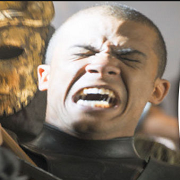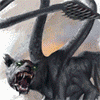|
hyphz posted:That's the common assumption that representations of RPGs seem to make, and that game books also make in their representation of the base of the social contract. But in practice it isn't borne out that much because even if the players would be unable to play without the GM, not getting to play the RPG isn't all that big a deal, since it was only "meh" to begin with. This is possibly something that's changed since earlier games with the huge improvement in the quality of board games and the availability of GM-less RPGs. This is counter to my experience and everyone else I've ever played with and it sounds like you and the people you play with don't actually like playing RPGs very much, and that might be the root of your problems and you should probably do something you'd actually enjoy
|
|
|
|

|
| # ? Jun 8, 2024 21:04 |
|
People looking for a GM to run a game for them have self-selected as wanting to play an RPG rather than a video game or board games, which are way easier to get a group going in.
|
|
|
|
Piell posted:This is counter to my experience and everyone else I've ever played with and it sounds like you and the people you play with don't actually like playing RPGs very much, and that might be the root of your problems and you should probably do something you'd actually enjoy It's possible, but I've thought for a while it's an elephant in the room for the whole hobby, as plenty of the things it promises are balanced out by standard issues that can't really be resolved (like turn delay). Basically there's way too many reports of drop-outs, cat herding, disengagement, "not doing the homework", etc for RPGs compared to any other involved hobby, for there not to be some established pattern there. Like, "I haven't updated my character sheet" is often heard in the D&D game in a local wargames club, but I don't think I've ever heard any of the wargamers say they forgot to update their army list. Absurd Alhazred posted:People looking for a GM to run a game for them have self-selected as wanting to play an RPG rather than a video game or board games, which are way easier to get a group going in. Absolutely - if that's how the group forms. But if it's the other way round and the GM looks for the players...
|
|
|
|
You don't hear players of 40K, for example, saying, "I forgot to update my army list" because that's not how army lists work. You will hear them say, "I didn't bring a list. 1500 points? Let me write one up real quick."
|
|
|
|
This is the B side of the record. Same theme, slightly different lyrics.
|
|
|
|
hyphz posted:It's possible, but I've thought for a while it's an elephant in the room for the whole hobby I'm sorry to inform you, once again, that good and fun things are possible actually.
|
|
|
|
So, I have a few mechanical-philosophical questions to ask for a selfish reason: I am currently in the process of designing a new game from the ground up and I am hoping to really sink my teeth into magic mechanics. What really creates a compelling system in y’all’s eyes? As it stands, i’m building a system where all of the players have access to at least one school of magic and up to 3 over the course of a campaign. I’ve been looking to White Hack for inspiration, but what other systems have you all found that encourage player creativity while keeping things balanced? Also, in your experiences, do you find that tight mechanical rules are preferred (i.e. the 5e system) or looser systems that require “rulings” (i.e. WhiteHack) are more engaging for long-term, multi-year play?
|
|
|
|
Gray Ghost posted:So, I have a few mechanical-philosophical questions to ask for a selfish reason: I am currently in the process of designing a new game from the ground up and I am hoping to really sink my teeth into magic mechanics. What really creates a compelling system in y’all’s eyes? As it stands, i’m building a system where all of the players have access to at least one school of magic and up to 3 over the course of a campaign. For long-term multi-year play, please read and learn from Burning Wheel. It is the system with the best, longest-term character progression I have seen.
|
|
|
|
one thing about the magic system in Shadow of the Demon Lord I really enjoy is that each spell is like, 3-4 sentences description without a huge list of attributes and components and whatnot that D&D has
|
|
|
|
Gray Ghost posted:So, I have a few mechanical-philosophical questions to ask for a selfish reason: I am currently in the process of designing a new game from the ground up and I am hoping to really sink my teeth into magic mechanics. What really creates a compelling system in y’all’s eyes? As it stands, i’m building a system where all of the players have access to at least one school of magic and up to 3 over the course of a campaign. If you're building magic systems where you expect all the players to participate I'd suggest taking a look at the systems for Mage: the Awakening and Ars Magica, which are both built around powerful, flexible magic. Although balance in MtAw is... iffy. (I haven't played AM so I can't speak to it, but I imagine it's also a little shaky because it's designed to only have one wizard being played at a time.) I'd also recommend taking a look at the way powers are structured in Nobilis and/or Godbound. Both are extremely high-powered but Nobilis (3rd ed) offers a way to define domains that's both flexible and mechanically sound, and Godbound is probably my favourite 'here is a list of powers, choose a few' way of doing magic. (Also good as a way of illustrating how you can make several distinct 'schools of magic' even if a few effects are repeated here and there.)
|
|
|
|
I’d argue magic is semi balanced in Mage (because after a bit everything plateaus into being a god).
|
|
|
|
Yeah, I would need a bit more info on what you are trying to accomplish with a 'magic system', some games approach it was a flexible system that is limited only by the imagination of the caster, some systems have rigid codified spells, some systems think of magic as something that is all about cost for power, with the effect in question needing an equivalent expenditure or sacrifice, and in some magic is pretty easy to use all day long. What are your inspirations here, how do you want magic to feel?
|
|
|
|
So strangely enough, Magic the Gathering is an inspiration in that the schools of magic are flexible, but well-suited to particular mechanics, actions, and intentions. I do want a flexible system that can grow with the character as they advance in power (i.e. get more reserves or resources to power their magic). I am also thinking of simplifying the resource management to something like “mana” and “vitality” (similar to stress and harm with games like Blades in the Dark). Players will be able to use less mana to accomplish their spells as time goes on. At the same time, i don’t want to overwhelm my players with a ton of sub-systems a la Invisible Sun. Edit: I also want the spells themselves to be flexible and without too many components a la D&D. If anything, I would treat components much like Blades treats load and item uses.
|
|
|
|
Gray Ghost posted:So strangely enough, Magic the Gathering is an inspiration in that the schools of magic are flexible, but well-suited to particular mechanics, actions, and intentions. I do want a flexible system that can grow with the character as they advance in power (i.e. get more reserves or resources to power their magic). Chris McDowall (of Into the Odd and Electric Bastionland fame) just wrote about the Magic color wheel and what it provides. It's not in the context of Magic qua magic, but might be worth looking at.
|
|
|
|
Absurd Alhazred posted:Chris McDowall (of Into the Odd and Electric Bastionland fame) just wrote about the Magic color wheel and what it provides. It's not in the context of Magic qua magic, but might be worth looking at. This was a really great, brief read and it definitely is the approach I want to take.
|
|
|
|
Jimbozig posted:For long-term multi-year play, please read and learn from Burning Wheel. It is the system with the best, longest-term character progression I have seen. Finally a reason to crack open my copy of the revised edition.
|
|
|
|
Gray Ghost posted:This was a really great, brief read and it definitely is the approach I want to take. Hurray! He's a pro follow, always something short and insightful on that blog.
|
|
|
|
Gray Ghost posted:So, I have a few mechanical-philosophical questions to ask for a selfish reason: I am currently in the process of designing a new game from the ground up and I am hoping to really sink my teeth into magic mechanics. What really creates a compelling system in y’all’s eyes? As it stands, i’m building a system where all of the players have access to at least one school of magic and up to 3 over the course of a campaign. What kind of game is this? Like, what are the default things that players get up to? Vancian magic works really well in a push-your-luck dungeon crawl setting, and super poorly everywhere else. Freeform magic sounds much more fun in a system where everyone has access to it and pretty obnoxious if that whole involved subsystem is entirely related to one character (sounds like this isn't an issue for you, at least). Magic that in some way harms, dooms, or maddens the caster is going to work very differently in a system that assumes ever-more-powerful heroes than one about desperate people trying to survive a hosed situation. D&D-style limited spell descriptions can be fun in a game all about creative problem solving or tactical combat, but feels pretty non-wondrous and non-mystical in practice. My advice is to think less about what magic systems are cool in general, and more about what you're hoping magic adds to the game. If you can figure out that, the rest usually answers itself
|
|
|
|
Is it worth asking about challenge impartiality or is this (or am I) dead?
|
|
|
|
hyphz posted:Is it worth asking about challenge impartiality or is this (or am I) dead? I personally am willing to postpone any final judgment until I hear more details.
|
|
|
|
Absurd Alhazred posted:I personally am willing to postpone any final judgment until I hear more details. It's essentially the question of how much a GM can, or should, adjust mechanical aspects of the setting to meet the PCs. The most obvious case is setting DCs - and I know not all games have them, but it's common enough to be relevant. The issue is that if the GM knows what the players' modifier is, then setting a DC instead becomes directly setting the chance of success, and potentially any rules the system has about how difficult it is for the player to get that modifier is potentially cancelled out.
|
|
|
|
hyphz posted:It's essentially the question of how much a GM can, or should, adjust mechanical aspects of the setting to meet the PCs. Let's take it out of the D&D comfort zone and into Call of Cthulhu. There your gradations are usually that the players clearly have their own things they're good or bad at - they rolled some dice or apportioned some points, definitely chose a profession and some other points to put into other skills, and/or chose a pregenerated character for a one shot - they made those mechanical decisions. So for usual challenges there's a certain probability of success, then if the challenges are doable but more difficult they have half that, and if they're at the edge of plausibility for this type of action, it's a fifth that. In any sense that you're "cancelling out" anything, you're essentially making a statement about the world, right? You're saying "driving a car under these conditions requires an Extreme success" - that is something about this challenge, about these conditions, that would be different than if you said "it just needs a regular success". Instead of being a rough, stormy, sleety night, it's a drizzly afternoon. So that's a design tool you can use when you're setting up the scenario. Because for the players, rolling a die in itself (or using some accessible random generator if a die is physically an issue) is not a challenge. The actual challenge for the players is finding a good way of figuring out how to approach a mystery, which sometimes includes rolling a die with some chance of success, and they know what their strengths are, so they can try and find how to apply their strengths to the problem.
|
|
|
|
hyphz posted:The most obvious case is setting DCs - and I know not all games have them, but it's common enough to be relevant. The issue is that if the GM knows what the players' modifier is, then setting a DC instead becomes directly setting the chance of success, and potentially any rules the system has about how difficult it is for the player to get that modifier is potentially cancelled out. I think this falls under a "personal campaign flavor" category, where there are multiple opposing answers that all can work perfectly well, but will be a big part of defining the GM's personal style. I, personally, would go pretty light on this--if I'm thinking about a challenge before the session, I'll try real hard not to think about my actual PCs when designing it (except maybe on the 'general premise' level). What I might do, though, is reward especially high rolls with bonus effects--beating the Perception check by 10 makes me think up some extra info to include, beating the lockpick by a bunch lets the PC do it as a bonus action instead of it taking several minutes, etc. Give people something special for beating your challenges extra hard, rather than homogenizing the challenge level. That said, I don't think the primary challenge should be coming from skill checks in the first place, which takes a lot of the pressure off of this question. A clever idea should be able to negate (or at least lessen) the need for a skill check, and an ambitious idea should be able to create a skill check where none was planned that creates interesting events whether it succeeds or fails
|
|
|
|
The question came up when the power gamer in the group unexpectedly asked if we could generate our own adventures rather than being tied to modules (partly because one of the recent APs was very disappointing) Which knocked me for a loop, to be honest. The thing is that I can see how power gaming works when there’s a module that’s written impartially, so the player can kick the module’s rear end and feel they’ve “defeated” a professional author, and compare themselves to others who played the same module. But with a homebrew or improvised adventure I have trouble seeing how power gaming really works. If they know his skill modifiers the GM can make anything easy or hard at will, no matter how they distributed their points. If the PC is weak against a particular enemy type, they can encounter it every time, or never, or 1:x times. And socially, the new player with a +5 in performance is as entitled to a moment in the spotlight as the player who minmaxed to the red line to get a +24 in picking locks. So how can it even work or be made to work?
|
|
|
|
The approach I take as a GM is that, if we are in a game and a player puts something on their sheet that is based around solving a specific problem, that is a signal from them they want to see that thing in the game. If they are a cleric and they take an option for turning undead, if I never put any undead in the campaign that is an utterly dead part of their character sheet. And if someone is really proficient at a certain skill, it means they want to roll that skill so I am going to put things in the game that pertain to it so they actually can play the character they showed up at the table to play. I don't ONLY do that, it is fun to give players a problem they are not suited for, but like I think of it as a basic responsibility of any GM to include locks that match the keys the PCs bring, because I have no interest in testing their ability to read my mind or the mind of some adventure path writer. As for like, specific difficulty, It depends on what I am going for, really. Plenty of games dont have scaling DCs and that is more often than not what I end up playing, but for ones that do, I defer to the game if it has guidelines, and tweak things on my own to achieve the sort of tone and pace we are looking to achieve. How much a GM could or should adjust these sorts of things is in the realm of the expectations of the group, imo. I am not disillusioned if a GM fudges a roll to make a more appropriate outcome from time to time, but for some people that is a deal breaker. I know plenty of people that are ok with, and even expect a GM to fudge things but don't want to know when it happens for the sake of their own immersion, and that can be where a good GM screen or the like can come in. edit: I can't offer much in the face of a power-gamer, as my response to that sort of thing as a GM is usually "do not" They are fundamentally playing a different kind of game than the one I play. Ash Rose fucked around with this message at 07:12 on Aug 8, 2021 |
|
|
|
I like that principle but it’s a huge paradox in practice. Like, it’s nice to say that if someone invests heavily in turning undead, then they want to encounter undead. But in fact, a player who does NOT take turn undead will have undead encounters that last longer at the table, are more tactically interesting, and carry more narrative weight; because they actually have to play through the problem, whereas the guy who did take it will just say “turn undead” and move on.
|
|
|
|
hyphz posted:But in fact, a player who does NOT take turn undead will have undead encounters that last longer at the table, are more tactically interesting, and carry more narrative weight; because they actually have to play through the problem This is making like ten different assumptions. You can put in more undead or tougher undead to make it so turn undead does not just trivialize things, an encounter that is more difficult does not necessarily carry more narrative weight than one that was 'easier', and this assumes any ability well suited to a problem is always an immediate zero-thought solution to it.
|
|
|
|
Ash Rose posted:This is making like ten different assumptions. You can put in more undead or tougher undead to make it so turn undead does not just trivialize things, an encounter that is more difficult does not necessarily carry more narrative weight than one that was 'easier', and this assumes any ability well suited to a problem is always an immediate zero-thought solution to it. The trick with this is that it shifts the meaning of taking the ability in the system. It takes the suggestion you made above, "what people put on their character sheets determines what they want to do" and entrenches it in the system, rather than using it as a guideline. It means that taking "turn undead" does not actually make the character better at dealing with the undead the party encounter; instead, the encounters are just as gruelling, but have stronger undead in them. Essentially, the character investment becomes a narrative preference. And if ever the fourth wall breaks on this it can easily be a kick in the teeth to a player who's playing tactically: usually when they roll badly and another PC gets eaten by a vampire who would not have been there but for them. While there's nothing wrong with taking abilities as narrative preference, most of the systems with turning undead in (and the player) might not be interested in narrative preference but tactical victory. And it seems awkward to take that away.
|
|
|
|
hyphz posted:The trick with this is that it shifts the meaning of taking the ability in the system. It takes the suggestion you made above, "what people put on their character sheets determines what they want to do" and entrenches it in the system, rather than using it as a guideline. It means that taking "turn undead" does not actually make the character better at dealing with the undead the party encounter; instead, the encounters are just as gruelling, but have stronger undead in them. Essentially, the character investment becomes a narrative preference. And if ever the fourth wall breaks on this it can easily be a kick in the teeth to a player who's playing tactically: usually when they roll badly and another PC gets eaten by a vampire who would not have been there but for them. When I join Bonny, the Vampire Slayer, I expect to encounter vampires, which she is good at dealing with, and I'm not. I bring something else to the Scooby Gang, so when slaying vampires good isn't good enough, because it's actually a wizard with a protection spell that needs to be removed, I can do the unspellening. That does mean that if she fails to get at a vampire, I could be in danger. So it goes. If my unspellening doesn't work, the wizard might kill Bonny, and we'll have to seek out Beatrice to continue to fight evil in all its forms. But really.... let's go really far from our usual topic. Not Call of Cthulhu. Not Buffy. Not even a role-playing game. Mario Maker. People play Mario Maker. People make Mario Maker games for each other. People specifically tailor-make Mario Maker levels to mess with specific players` biases because they know them well. They are all having a lot of fun. The issue is still that we aren't talking about players` actual skills because writing 90% instead of 50% on a sheet and getting a random number to get under it when you want it isn't in itself something you normally have to develop skills for (accessibility caveats nonwithstanding - if someone can't roll a die you would find another way for them to get that random number).
|
|
|
|
Ash Rose posted:The approach I take as a GM is that, if we are in a game and a player puts something on their sheet that is based around solving a specific problem, that is a signal from them they want to see that thing in the game. If they are a cleric and they take an option for turning undead, if I never put any undead in the campaign that is an utterly dead part of their character sheet. And if someone is really proficient at a certain skill, it means they want to roll that skill so I am going to put things in the game that pertain to it so they actually can play the character they showed up at the table to play. I don't ONLY do that, it is fun to give players a problem they are not suited for, but like I think of it as a basic responsibility of any GM to include locks that match the keys the PCs bring, because I have no interest in testing their ability to read my mind or the mind of some adventure path writer. And, building off that, I think the GM's primary goal in a game like D&D (or others that are more focused on combat and setting static difficulties) is to challenge, but not necessarily defeat the players. There's a really good endorphin rush a player gets when the party encounters a challenge that their character is tailor-made to overcome or is able to otherwise negate. When the party is confronted by a giant horde of undead that would otherwise decimate the party it feels really good to be the Cleric who steps in and says "Never fear, I can Turn Undead!". There's a delicate balancing act to play as, if the party always has someone who can negate the obstacles they face, they're going to lose that sense of being challenged, things are going to get boring and the players are going to become disengaged from the game itself. Speaking to the earlier point about modifying DCs: I think it's helpful to think of these as a way to filter how PCs can approach a problem and a way to vary up what kinds of solutions are going to be more viable. A encounter with a single, static skill check to bypass ("You encounter a door, it's a DC 15 check with Thieves' Tools to open it") is much less engaging than a problem that can be solved multiple different ways with their own difficulty to achieve and unique results of solving the problem this way (You encounter a door, the DC is 20 to pick the lock with Thieves' Tools but it's only DC 12 to knock the door down with Athletics, however if you knock the door down it's going to make a lot of noise and potentially attract wandering monsters..."). DCs can also be a way to filter out solutions and reward the player's mechanical choices: That they have a Rogue with a +8 bonus to Thieves' Tools means that quietly picking the lock rather than noisily breaking the door down is a much more viable option than it would be for a party without a Rogue. Basically, hyphz, I think you need to stop looking at skill challenges and obstacles as binary pass/fail situations that exist in isolation and start thinking about them more as a series of decisions that are presented to your players, because it's less important if they succeed or fail at a given a challenge, and much more important HOW they succeed or fail at a particular challenge, as these are going to dictate what the next set of challenges they face will be.
|
|
|
|
Ash Rose posted:The approach I take as a GM is that, if we are in a game and a player puts something on their sheet that is based around solving a specific problem, that is a signal from them they want to see that thing in the game. If they are a cleric and they take an option for turning undead, if I never put any undead in the campaign that is an utterly dead part of their character sheet. And if someone is really proficient at a certain skill, it means they want to roll that skill so I am going to put things in the game that pertain to it so they actually can play the character they showed up at the table to play. I don't ONLY do that, it is fun to give players a problem they are not suited for, but like I think of it as a basic responsibility of any GM to include locks that match the keys the PCs bring, because I have no interest in testing their ability to read my mind or the mind of some adventure path writer. I have recently started to look a bit more at 13th Age, and I feel like it extends this more or less implicit directing of the story through character build choices by making it more explicit. Essentially, Icons are powerful NPCs/Demigods/Gods/Entities that you might or might not encounter in person, but who also have different agendas, followers (and sometimes even institutions) etc. In turn, every player chooses a number of "Icon relationships", i.e. relationships between their character and one or more of these entities. As such, players can decide and show which parts of the world they care about, which agendas they might want to engage with (in any shape or form) and so on. So not only could the priest's player choose "Fights Undead really well" in terms of skill choice, but the player can additionally emphasise that the supreme Necromancer is one of their character's major Icon relationships (in this case most likely in terms of an antagonistic relationship), making sure that the undead will feature during play. However, since every player has these relationships, and since they get rolled as dice rolls before each session, chances are that while the priest will see these relationships come into play repeatedly throughout, they most likely will not be the sole focus, unless all other players chose the same relationships. I think this is a fairly good way of making sure that players can communicate expectations and somewhat direct the general flow of play, without any one player able to dictate where things are headed. However, since complications are part of the whole system, like Ash Rose says, this does not turn into an automatic success simply because e.g. undead are involved, and even the anti-undead priest might run into problems when fighting them, but one way or the other, it allows a GM to make sure that the players' choices matter, and are represented.
|
|
|
|
Some of the most famous modules of all time were written by a DM specifically to challenge his personal group of powergaming players. The most well known of these is the Tomb of Horrors but we can't forget the Temple of Elemental Evil, which was created to stymie a troublesome solo player (who then "trashed it from top to bottom" according to Wikipedia). This type of adversarial design is something you normally want to avoid, but if your players are "powergamers" looking to test their skill, it's a legitimate way to run the game. The main challenge is the intense effort of actually designing, stocking and keying custom dungeons, which is the primary reason prepackaged dungeon modules exist in the first place.
|
|
|
|
hyphz posted:The trick with this is that it shifts the meaning of taking the ability in the system. It takes the suggestion you made above, "what people put on their character sheets determines what they want to do" and entrenches it in the system, rather than using it as a guideline. It means that taking "turn undead" does not actually make the character better at dealing with the undead the party encounter; instead, the encounters are just as gruelling, but have stronger undead in them. Essentially, the character investment becomes a narrative preference. And if ever the fourth wall breaks on this it can easily be a kick in the teeth to a player who's playing tactically: usually when they roll badly and another PC gets eaten by a vampire who would not have been there but for them. Fighting bigger and stronger undead/traps/goblins in a system like D&D gives you more xp and treasure so being able to blast through the weak ones and be able to take on stronger ones on even footing is still rewarded. The guy that maxed out his undead/trap/goblin slaying lets the group go to floor 4 of the dungeon instead of floor 3 before they have to turn back. Being able to fight tougher obstacles because you've got good obstacle defeating skill so you trivialize the weak ones is also positive on your "interesting tactical choices" axis, presumably the weak enemies are ones who only attack and you just hit them back and forth (like skeletons, zombies, goblins with a sword etc), the stronger ones have multiple moves that mean you get to make more meaningful tactical choices on how to react and deal with them. As long as they don't only go up against the most difficult thing every time its fine. You have the weak ones there sometimes so the player can show off their cool move and character choices and then you have the strong ones for the cool fights. If someone picks a thing to be good at the choices aren't only providing easy challenges they cruise through or tough challenges that their thing doesn't work super good on. I know you're going to say "what's the correct ratio of easy:hard things?" and the answer is I don't know. It depends on your group and you just have to be upfront and say that you're trying something and if it's bad you're sorry but if they give you feedback you can adjust it to hopefully have it be better next session. If they aren't horrible little gremlin creatures then they won't call you a shithead for not getting the game perfectly balanced on your first try.
|
|
|
|
hyphz posted:the encounters are just as gruelling Playing a game being "grueling" is already a fail state barring some very specific games, and I don't know of any like that in the sphere of RPG's : I take umbrage with the assumption that this would happen in a game, let alone be the norm. Also, not so much to you, hyphz, in specific, but just in general : "powergaming" is not a bad thing in a game nor is it in opposition to liking good narratives or being into characterization. That is the dumbest old stereotype that really needs to be forgotten on the scrap heap of lovely jokes about buying the GM pizza. It's all just bullshit from before I was even born because someone got mad at Josh for reading the book and playing by the rules instead of following some weird, unspoken gentleman's agreement that the only way to be an interesting character is to give yourself 3 INT and role-play an offensive impression of a mentally challenged person. Fuuuuuck that poo poo. I'm a lifelong powergamer, and my favorite kind of munchkining things up in play is taking something like a PbtA, juicing my character to the gills and then playing it straight because the rules are written well enough so that it's fun for the whole group to do that*. Why yes, my Battlebabe with a 7-harm, messy shotgun and min-maxed stats does look broken, but it's only good at making fun stories in the theme of the game so it works out in play.
|
|
|
|
EthanSteele posted:I know you're going to say "what's the correct ratio of easy:hard things?" and the answer is I don't know. It depends on your group and you just have to be upfront and say that you're trying something and if it's bad you're sorry but if they give you feedback you can adjust it to hopefully have it be better next session. That's part of the issue, but it's more the issue of the interaction of this balancing with "minmaxing". And unlike usual, it's the "minning" bit that's the problem, not the "maxing". Some players will minmax so hard that their PCs can have literally no response on involvement in anything they've "minned" with. At that point, it seems it's a no-win for the GM; if you put them against the thing they've minned against, you know in advance they won't be able to do anything and they won't have any fun. If you don't put them against it, they get the maxing for free. Ideally you could put this down to a fault in the system - that no player should be able to minmax their character so far that the "minned" activity in-character hits the social contract for keeping the player engaged. But I'm not aware that any system does that, especially given that engagement levels vary wildly.
|
|
|
|
Personally I try to avoid thinking in terms of "balance" for the most part. I just sort of come up with concepts that seem interesting, and then represent them in ways that make sense to me and let the players sort it out. It requires being willing to make a story out of whatever the players choose to do, because if you have a set story in mind then you have to be much more mindful of what you put in their way, because they don't have any choice but to throw themselves against it because there's nothing else in the game. But if the group has no problem taking one look at something horrible and turning around and doing something else then you don't have to worry about balance nearly as much because it's now their problem to look after their own best interests.
|
|
|
|
hyphz posted:Ideally you could put this down to a fault in the system - that no player should be able to minmax their character so far that the "minned" activity in-character hits the social contract for keeping the player engaged. But I'm not aware that any system does that, especially given that engagement levels vary wildly. The problem you're describing (I think) is absolutely a system problem. If you're playing a system which strongly rewards specialisation, then you're always going to have the problem where a minmaxed character trivialises everything within their gimmick and is powerless against things outside it. They could build a character with a second string, but every resource spent doing so is a resource they don't have for their primary gimmick -- and so long as that gimmick applies to like 90% of encounters that's a bad trade. This is traditionally, note, a problem for martial characters rather than spellcasters because spellcasters' primary gimmick is 'do everything'. What you want is a system which hits at least one of these three points:
And there are loads of systems which do at least one of those. Apocalypse World, for example. Spire. D&D4e. Anything in Fate. Fellowship. Probably others but it's late and I should be sleeping. When you've got one of those points in place it's much easier to write adventures because you don't need to worry so much about choosing around the strengths of the party and can just throw in a load of interesting stuff.
|
|
|
|
hyphz posted:Some players will minmax so hard that their PCs can have literally no response on involvement in anything they've "minned" with. At that point, it seems it's a no-win for the GM; if you put them against the thing they've minned against, you know in advance they won't be able to do anything and they won't have any fun. If you don't put them against it, they get the maxing for free. Yep, that is absolutely a thing that can happen, which is why you have to address it before it happens and make sure everyone understands what the situation is with a character that is extremely specialized and how it could shake out and often the solution is getting them to adjust the character so the gameplay isn't trivial/brick-wall and is instead very easy/bit tough.
|
|
|
|
It also helps if sessions aren't linear sets of skill checks--to a large extent, the players should be choosing which skill-check-gates they're engaging with, and should be coming up with ones you hadn't even thought of beforehand. You can get past the guards with a DC 12 Stealth check, a DC 20 Manipulation one, a DC10 Manipulation check with a stolen badge, an invisibility potion, bribing a kid to throw some fireworks in a nearby alley as a distraction, or any other way you can think of. Throwing an obstacle with a hard skill check associated with it isn't a wall, it's a prompt for creativity--which can be negated with high enough stats (granted, this dynamic does suck, which is why I really don't like infinitely scaling skill systems) And if they fail, that's fine. It just adds chaos into the story, and takes things in fun new directions.
|
|
|
|

|
| # ? Jun 8, 2024 21:04 |
|
I'm not the most experienced GM on these forums by a long shot, so the following statement is not especially comprehensive, but: I can't recall ever presenting my players, in any system, with a challenge that can only be overcome with a specific skill check. Which is good, because if you do that, someone's going to roll a string of 1s or whatever and you'll have to scramble for an alternative anyway. More broadly, I think it's important not to loose sight of the forest while you look at each successive tree in detail, and by that I mean, the players and their characters are having adventures, they're not: making a thievery check and then making a climbing check and then having a fight with some undead and then making a wilderness survival check and then having a fight with an evil wizard, etc. etc. Yes, as a GM you may need to do enough prep that you can provide "a series of challenges" at a mechanical level, but an Adventure is more than the sum of its dice rolls. It should hang together with some kind of, here is that word again, plot, or if you like, the players should have some sense that their characters are trying to accomplish something, bigger than getting past the next die roll. Having a goal (or several - I like to think in TV script terms of an A plot, 1-3 B plots, and for longer campaigns, perhaps a 'character development' theme) can be a useful tool for avoiding the pitfall of creating bottleneck situations where the question of intentionally targeting someone's "min" or their "max" becomes vital. ...It's also really helpful to get your players to make their characters together as a party. They're much more likely to intentionally cover each other's "mins" so that, even if all of the characters are min/maxed, it's unlikely that any given encounter will find none of the characters able to show off some competence.
|
|
|
























